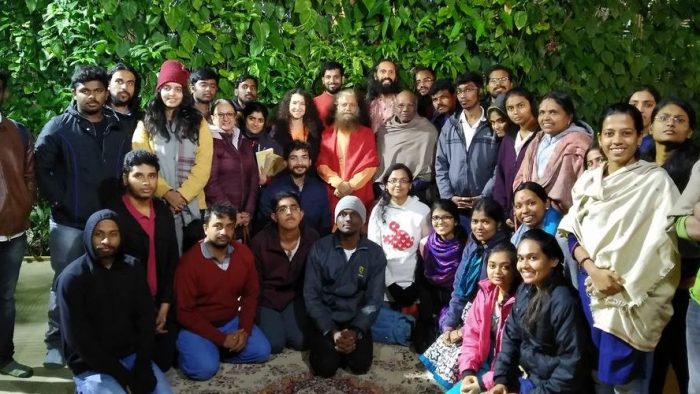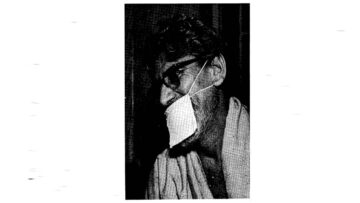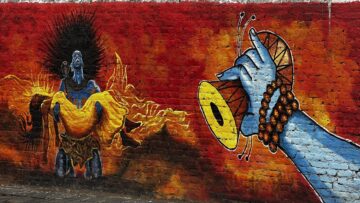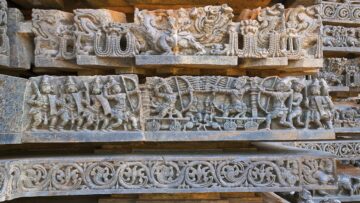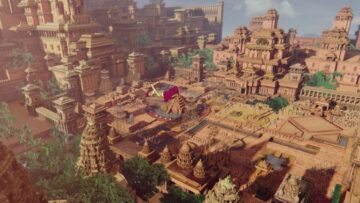Swami Vivekananda was right when we said “Supreme value of youth period is incalculable and indescribable. The way in which you utilize this period will decide the nature of coming years that lie ahead of you. Your happiness, your success, your honor and your good name all depend upon the way in which you live now, in this present period. Remember this. This wonderful period of the first state of your life is related to you as the soft wet clay in the hands of the potter”.
Youth across the world are filled with energy and enthusiasm. They also have a lot of questions, right from mundane aspects of life to existential ones. When encouraged and engaged with properly, these questions have the potential to transform into a deeper quest. Their energy and enthusiasm when put to the right use can transform the lives of the individual, the society, and nation at large. Adopting the right frameworks and worldviews can help them bring about this transformation. What they need are tools that help them act with dynamic and vibrant energy that is rooted in inner stability. The Indian tradition offers us frameworks and tools through its well developed philosophies, knowledge systems and integrated lifestyle practices and Vikasa retreat leverages on this rich knowledge.
Fourth Edition of the Retreat: Dec 2018
Vikasa, the Indic Youth Leadership retreat offered by Anaadi Foundation, is designed to inspire youth through this rich and vast Indic knowledge and provides mental tools to awaken their leadership potential. This year, the retreat was offered from 27 December to 2 January at Rishikesh and was the fourth edition of the retreat. Indic Academy sponsored a few registrations that was extremely beneficial to some of the participants. The main aim of the retreat was to bring out the thought that “Leadership” is not just to do with leading a team of people but developing a sense of ownership in whatever one takes up and to experience life with full involvement as highlighted in both the Mahabharata and Bhagavad Gita.
The Kriya Yoga ashram, a beautiful serene place in Rishikesh, provides the right ambience for self-reflection and imbibing the core of Indian thought process. The meditation hall in the ashram makes even the uninitiated meditate without knowing the passage of time. It is common for participants to say that back home they never closed their eyes for more than five minutes but here they meditated for hours and didn’t know the time.
Sh. Adinarayanan, Founder, Anaadi Foundation, who has spent more than 100 days in Mouna, delivered the essence of Indic leadership through his proficiency in blending modern sciences, policy, governance with ancient principles from the Mahabharata and Bhagavad Gita. His sessions, that blended humor, storytelling and meditative pauses, kindled a deep sense of curiosity about the relevance of the various aspects of Indian culture and tradition. With a right mix of rigor and relaxation, Sh. Adinarayanan’s sessions touched upon diverse aspects of leadership right from self to the society and environment. His unique approach to allow lot of scope for question and answers during the sessions helps the participants gain that “ah ha” moment immediately as their doubts get clarified.
His sessions were well supplemented by Ms. Varalakshmi of Anaadi Foundation and Sh. Shyam Krishnakumar of Vision India Foundation who spoke on Indian sciences and aspects of modern day policy and governance.
Dr. Mala Kapadia, Founder of Human Potential Consulting named ‘Tame the Monkey’ and Adjunct Professor with S. P. Jain School of Global Management Dubai Singapore Sydney Mumbai Campuses offered sessions on Indic ecology and lifestyle. Dr. Mala brought a wonderful blend of modern day management principles and wisdom of the Indian spirituality.
The participants were from diverse backgrounds including students, public policy enthusiasts working professionals and educators.
A Day At Vikasa
A typical day at Vikasa starts at 7.00 in the morning with Yoga sessions. The yogic practices helped the participants to manage the cold winter at Rishikesh. The morning sessions were handled by Sh. Adinarayanan and focused on providing an overall understanding of various domains including education, ecology, governance, warcraft and purpose of human life through Indic frameworks.
A historical perspective, right from ancient India and tracing it to modern times, was discussed. Some of the topics include:
- Social structures in Ancient India
- Indian Principles of Good Governance and Leadership
- Educational Models: A Continuum from Ancient to Modern India
- Inter and Intra Country Relations: Principles and Strategies of Peace and War
- Understanding Indian Ethos through Astronomy, Yoga and Indian Health Systems
- Indic principles of Ethics, Responsibility and Sustainability
Foundational Principles of Right Action: Purushartha
The post-lunch sessions were dedicated to providing hands-on experience on the frameworks through group activities and discussions.
The sessions on Ayurveda and Indian Astronomy gave the participants a glimpse into the interconnectedness of the universe and how our thoughts and actions impacted everything around us. A key aspect of leadership is good health and vitality. While modern medicine takes a symptomatic approach, there is much to learn from the Ayurvedic system of health which is more holistic and integrated. It was eye-opening to many participants when they discovered their ayurvedic body types, the foods that are suitable for them and how many aspects of our current lifestyle lack awareness.
Reflections
Today’s youth have questions and doubts with respect to the traditions that are followed at home. Without scientific evidence and intellectual understanding, it is difficult for them to be convinced about them. Some of the sessions were also dedicated to decoding some of the age old practices in our tradition including the role of women in the society, design of temples and practices like Ganga Arthi where thousands of flowers are set afloat in the river. This was supplemented with an understanding of contemporary issues of Sabarimala temple, treating Ganga as a living entity and policies that align with the cultural ethos of the land.
Participants also got the opportunity to visit Vashishta Gufa and the Ganga Arthi at Paramarth Niketan. The participants also had an exclusive darshan and interaction with Pujya Swami Chidanand Saraswati of Paramarth Niketan. Swamiji spoke to the youth regarding the importance of contributing to the welfare of the society and conservation of the environment.
Overall the retreat was an opportunity for participants to gain inner clarity to support effective outer action. This retreat was an opportunity to reflect upon and imbibe qualities that make for a true leader: compassion, vision for the larger good, a sense of ownership, self-reliance, energetic action, decision-making with clarity, inspirational stewardship and self-poise through examples and case studies from the Indian tradition.
Disclaimer: The opinions expressed in this article belong to the author. Indic Today is neither responsible nor liable for the accuracy, completeness, suitability, or validity of any information in the article.

